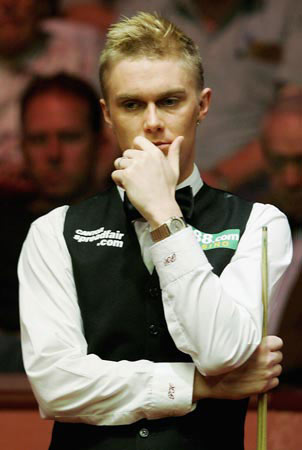| Tools: Save | Print | " target="_blank" class="style1">E-mail | Most Read |
| Billiardist: Paul Hunter Dies of Cancer |
| Adjust font size: |
|
The three-times Masters champion from Leeds passed away at 8.20pm at Kirkwood Hospice in Huddersfield, five days before his 28th birthday. The death of the popular Yorkshireman will bring immense sadness to the snooker world and to British sport.
Paul Hunter (file photo) Hunter was diagnosed 18 months ago with neuro-endocrine tumours, a rare form of cancer which causes slow-growing tumours in the lining of the body to release excessive amounts of hormones. He underwent several gruelling courses of chemotherapy in hope of beating the disease, but to no avail. His condition deteriorated rapidly in recent weeks and he was taken into the hospice on Saturday. Hunter leaves behind wife Lindsey and daughter Evie Rose, who was born on Boxing Day 2005. World Snooker chairman Sir Rodney Walker said: "I'm sure that everyone who met Paul, as well as his millions of fans and the sporting public as a whole, will join me in sending most sincere sympthies to Lindsey, Paul's parents, his family and friends. "Paul was a man who had everything going for him - an oustanding talent, good looks, fame, riches, charm and a beautiful wife. This shows us just how quickly life can change. "It's a bitter blow for snooker but most importantly for his family and our thoughts are with them." Hunter grew up in Leeds and attended Cardinal Heenan High School, spending most of his spare time developing his natural aptitude for snooker. He was coached in his formative years by 1986 World Champion Joe Johnson. After winning the Pontin's Star of the Future event twice, he turned professional in 1995 and made an immediate impact, beating Stephen Hendry on his way to the semi-finals of the Welsh Open at the age of just 17. Two years later he returned to the same event at the Newport Centre to win his first ranking tournament, beating John Higgins in the final to establish himself as a major contender in the sport. That victory helped Hunter break into the top 16 and he continued to climb the rankings to reach a career peak of No 4 in 2004/05. He won the Welsh Open again in 2002 and the British Open later that year. But Hunter's most significant success came in snooker's most prestigious invitation event - the Masters. In 2001, he reached the final at Wembley for the first time and came from 7-3 down to beat Fergal O'Brien 10-9. His comeback was aided by a flurry of rapid high scoring as he rattled in four century breaks in six frames. His media profile developed swiftly and he became known as the 'Beckham of the Baize' for his glamorous image. Hunter won the Masters twice more in the next three years, remarkably both times by a 10-9 scoreline after recovering an apparently insurmountable deficit. In 2002 he came from 5-0 down to beat Mark Williams and in 2004 over 5million viewers on BBC Sport saw him beat Ronnie O'Sullivan having trailed 7-2. When the diagnosis of cancer was announced in April last year, Hunter promised his fans that he would be as "tenacious and positive" in his fight against the disease as he had been throughout his snooker career. Despite suffering from considerable pain as well as numbness in his limbs, he bravely competed on the circuit throughout the 2005/06 season. He subsequently announced his wish to take a break from snooker in order to receive more treatment. In July this year, his fellow professionals voted for a change to the contitution of the WPBSA which allowed Hunter to successfully apply to have his official world ranking frozen at No 34 for a season. Backstage at snooker events, Hunter's charisma, cheerful persona
and laid-back approach to life made him universally popular among
players, officials, media and fans. He will be sadly missed by
all. Following his first-round match, Hunter was requested for a press conference. When he did not appear within 20 minutes, his whereabouts was sought. Hunter was soon discovered in the arena, patiently signing autographs and having photos taken with Chinese fans, and he remained there until every request was met. This was just a few days after he had been diagnosed with the disease which was to bring his end. (worldsnooker.com October 10, 2006) |
| Tools: Save | Print | " target="_blank" class="style1">E-mail | Most Read |
 |
| Related Stories |
|

